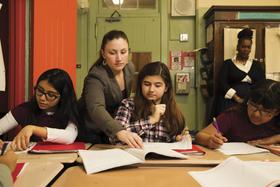The No Child Left Behind (NCLB) act mandated that all public schools evaluate their teachers based upon stricter qualifications. However, not all schools have revamped their employee rosters and hiring checklists, leading parents to wonder, "are my child's teachers still qualified?"
According to the US Department of Education in 2005, all public school teachers must be considered "Highly Qualified" in order to teach. To be labeled as a "highly qualified teacher," instructors must hold a bachelor's degree, full state certification, and proof of subject-area competency.
While the standards of a "highly qualified teacher" are generally reasonable, many schools in the United States expressed challenges in achieving these goals. Specifically, schools in rural areas found it nearly impossible to hire new, "more qualified" teachers than the limited number currently employed. As a result, the mandates of NCLB were revised to allow for more flexibility.
To find out if your local public school teachers meet all of the NCLB qualifications, consider the following standards outlined by the legislation.
NCLB "Highly Qualified" Requirements
The requirements for achieving the "highly qualified" teaching status depends upon one's subject area and additional state-based guidelines. Generally, all elementary teachers are required to meet the following criteria:
- More than 180 days of teaching experience
- Pass state-mandated subject tests
- Certified for all elementary education (as opposed to specific subject areas)
Middle school and high school teachers are required to meet the following criteria:
- More than 180 days of teaching experience
- Passing score on state subject-area tests (or national boards for some states)
- Endorsed by the state in which one teaches (or a cooperating state that's pre-approved)
- Earned a degree with a major and/or minor in the subject areas that are being taught
- Additional continuing credits may apply
To ensure that all teachers are meeting the NCLB "highly qualified" status criteria, most public schools hire human resource agents to verify the qualifications of each teacher. If a school employee is not considered to be "highly qualified," he or she typically has a maximum of three years to complete all necessary training, testing, and other demands to satisfy the requirements.
Additionally, alternative measures may be permitted. For example, as the US Department of Education explains, teachers who work in eligible rural districts can also work to meet the "highly qualified" requirements after receiving additional forms of "Professional development, intense supervision or structured mentoring to become highly qualified in those additional subjects."
This video explains what you have to do to become a teacher.
Teachers without Degrees in Education
Although it may be surprising, the demands of NCLB do not actually require all teachers to hold degrees in education. For example, if a high school English teacher has more than 180 days of teaching experience, holds a valid bachelor's degree in English, and has passed all state and federal English tests, then he or she meets the "highly qualified" standards - even though the teacher does not hold a degree in education. As the New York Times reveals, "School districts typically prefer teachers with advanced degrees on the premise that these individuals possess a deeper understanding of teaching, learning, and human development."
In lieu of an actual education degree, many public school systems have established their own methods for evaluating a teacher's abilities. Specifically, most public schools require teachers to meet criteria such as:
- Passing approval of classroom observations
- Review and approval of student work
- Evaluation of student test scores and performance
- Student and/or colleague review of teaching performance
While some schools may specifically hire teachers with education degrees, many public school leaders are open to hiring individuals with experience, federally mandated qualifications, and evident mastery of content matter.
The No Child Left Behind act changed how many schools evaluated and hired their teachers. With the exception of schools in rural areas, most parents can rest assured that their local public school teachers are "highly qualified" or at least working towards this qualification, to teach their children.
NCES Data on teacher Qualifications
The National Center for Education Statistics offers the following information about teacher qualifications: "The percentage of public school teachers who held a postbaccalaureate degree (i.e., a master’s, education specialist, or doctor’s degree)1 was higher in 2017–18 (58 percent) than in 1999–2000 (47 percent). This pattern was observed at both the elementary and secondary levels. Some 55 percent of elementary school teachers and 61 percent of secondary school teachers held a postbaccalaureate degree in 2017–18, whereas 45 and 50 percent, respectively, held a postbaccalaureate degree in 1999–2000. In both school years, a lower percentage of elementary school teachers than secondary school teachers held a postbaccalaureate degree."
"In 2017–18, some 90 percent of public school teachers held a regular or standard state teaching certificate or advanced professional certificate, 4 percent held a provisional or temporary certificate, 3 percent held a probationary certificate, 2 percent held no certification, and 1 percent held a waiver or emergency certificate. A higher percentage of teachers in 2017–18 than in 1999–2000 held a regular certificate (90 vs. 87 percent). In both school years, a higher percentage of elementary than secondary school teachers held a regular certificate (88 vs. 85 percent in 1999–2000; 91 vs. 90 percent in 2017–18)."
"In 2017–18, about 9 percent of public school teachers had less than 3 years of teaching experience, 28 percent had 3 to 9 years of experience, 40 percent had 10 to 20 years of experience, and 23 percent had more than 20 years of experience. Lower percentages of teachers in 2017–18 than in 1999–2000 had less than 3 years of experience (9 vs. 11 percent) and over 20 years of experience (23 vs. 32 percent). At the same time, the percentage who had 10 to 20 years of experience was higher in 2017–18 than in 1999–2000 (40 vs. 29 percent). There was no measurable difference between 1999–2000 and 2017–18 in the percentage of teachers with 3 to 9 years of experience."
Questions@ Contact us on Facebook. @publicschoolreview















